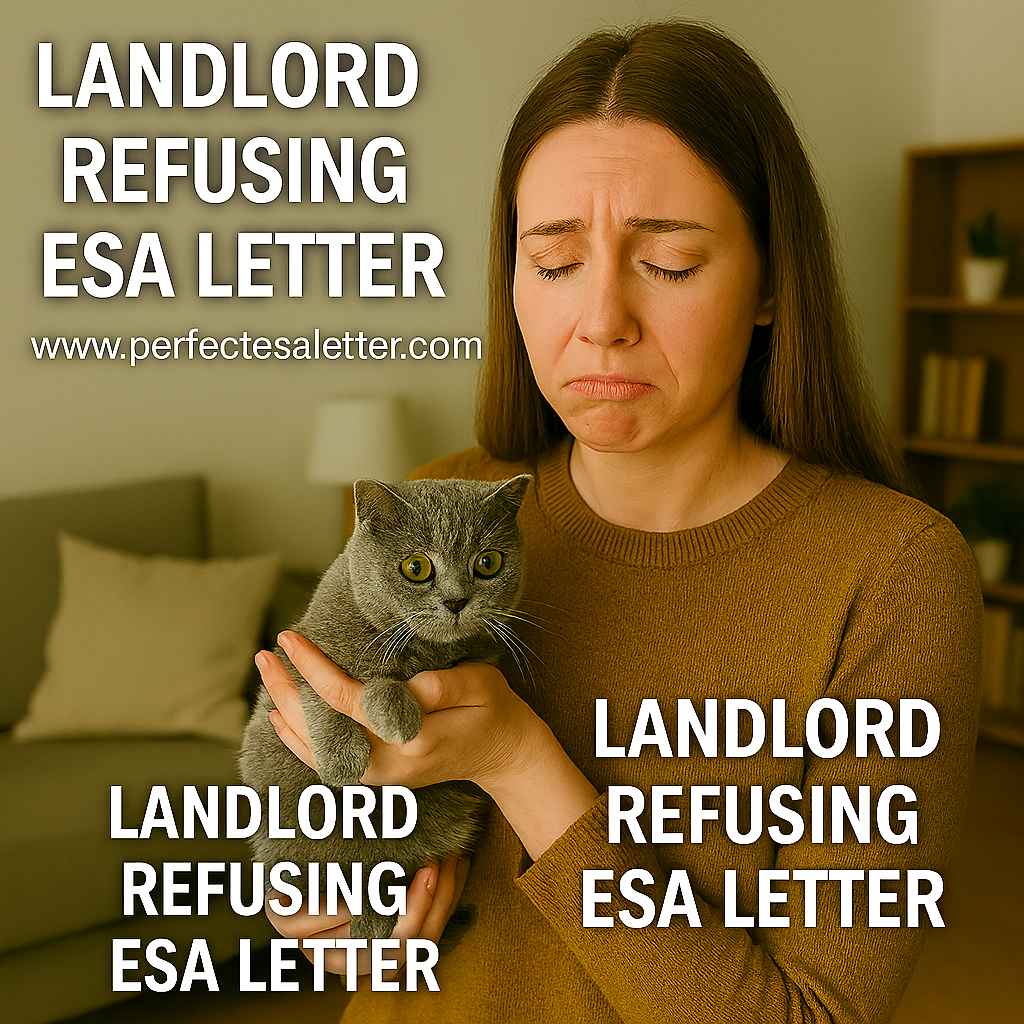What to Do if Your Landlord Is Refusing Your ESA Letter
Article
Introduction
Emotional Support Animals (ESAs) provide essential emotional and mental health support for individuals with diagnosed conditions. A valid ESA letter from a licensed mental health professional allows tenants to request accommodations in housing, even in properties with “no-pet” policies.
However, some landlords may refuse an ESA letter, either due to misunderstanding the law, fear of property damage, or miscommunication. If you’re dealing with a landlord refusing your ESA letter, it’s crucial to know your rights, legal protections, and steps to resolve the situation.
”Get Yours Now!
Don’t wait until a landlord or airline tells you “no pets allowed.” Protect your rights today.
Please fill out this form and our team wil contact you ASAP.
Complete your assessment in minutes , get approved by a licensed professional, and receive your letter within 24 hours.
Understanding Your Rights
Under the Fair Housing Act (FHA), landlords are required to make reasonable accommodations for tenants with ESAs:
- You are not required to pay pet fees or deposits for your ESA.
- Your ESA letter must come from a licensed mental health professional.
- Landlords cannot refuse housing solely based on your ESA if proper documentation is provided.
Landlords may only deny accommodations if:
- The animal poses a direct threat to health or safety.
- The animal causes substantial property damage.
- The accommodation would impose an undue financial or administrative burden.
❌ Discrimination against tenants with ESAs is illegal under federal law.
Common Reasons Landlords Refuse ESA Letters
- Misunderstanding ESA Laws
- Many landlords confuse ESAs with pets and are unaware of legal obligations.
- Suspicion of Fraudulent ESA Letters
- Landlords may question the validity of letters from unlicensed or online sources.
- Fear of Property Damage
- Concerns about cleaning, wear and tear, or allergic reactions from other tenants.
- Policy Conflicts
- Pre-existing no-pet policies may create confusion about ESA exceptions.
Steps to Take if Your Landlord Refuses Your ESA Letter
- Provide Proper Documentation
- Ensure your ESA letter is valid, on official letterhead, dated, and signed by a licensed mental health professional.
- Include the professional’s license number and contact information.
- Educate Your Landlord
- Politely explain the difference between ESAs and pets.
- Share information about the Fair Housing Act and legal protections for ESAs.
- Request a Formal Meeting
- Schedule a discussion with your landlord to review your ESA letter and address concerns.
- Be professional and prepared with documentation supporting your accommodation request.
- Document All Communication
- Keep emails, letters, and notes from conversations. This documentation may be necessary if legal action becomes required.
- Seek Legal Assistance
- If the landlord continues to refuse, contact a tenant rights attorney or a Fair Housing agency.
- Agencies like the U.S. Department of Housing and Urban Development (HUD) handle complaints regarding ESA discrimination.
Tips to Prevent ESA Letter Refusal
- Use Verified ESA Letters – Letters from licensed professionals carry more weight.
- Confirm Housing Policies Before Moving In – Ask landlords about ESA accommodations upfront.
- Know Your Rights – Familiarize yourself with federal and state laws regarding ESAs.
- Be Polite but Firm – Maintaining a professional tone increases chances of a positive outcome.
- Provide References if Needed – Previous landlords or mental health professionals can vouch for your ESA.
Real-Life Example
Samantha, who has an ESA cat for anxiety, applied to a downtown apartment. The landlord initially refused her ESA letter, citing a strict no-pet policy.
She submitted a valid ESA letter from her licensed therapist and shared information about the Fair Housing Act. She also provided documentation of her ESA’s behavior history, demonstrating no prior property damage.
After a formal meeting, the landlord accepted her ESA, waived the pet deposit, and allowed her to move in without penalties.
This example shows that proper documentation, education, and professional communication can resolve most ESA-related disputes with landlords.
FAQs
Q1: Can a landlord refuse my ESA letter if I live in a pet-free building?
👉 No. Federal law requires landlords to make reasonable accommodations for ESAs regardless of pet policies, unless specific exceptions apply.
Q2: What if my ESA letter is from an online provider?
👉 Letters from verified and licensed mental health professionals are more likely to be accepted. Unverified online letters may be questioned.
Q3: Can a landlord charge fees or deposits for my ESA?
👉 Generally, no. ESAs are not considered pets, so pet fees or deposits should not apply unless there is property damage.
Q4: Who can I contact if my landlord refuses my ESA letter?
👉 You can contact HUD, a local fair housing agency, or a tenant rights attorney.
Q5: Are landlords allowed to request additional proof?
👉 Yes, landlords may request verification of your ESA’s necessity, but this must be done respectfully and cannot be discriminatory.
Conclusion
If your landlord is refusing your ESA letter, it’s essential to understand your rights, provide proper documentation, and communicate professionally. Most refusals can be resolved with education and verified ESA letters.
Your ESA is an essential companion, and federal law protects your right to housing accommodations. By following the steps outlined above, you can ensure that your emotional support animal is allowed in your rental, maintaining your well-being and legal protections.
”Get Yours Now!
Don’t wait until a landlord or airline tells you “no pets allowed.” Protect your rights today.
Please fill out this form and our team wil contact you ASAP.
Complete your assessment in minutes , get approved by a licensed professional, and receive your letter within 24 hours.

